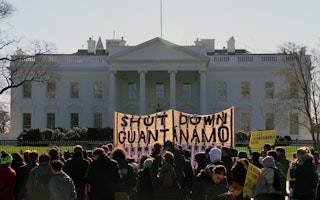Despite the seemingly entrenched conservative-dominated environment, advocates of progressive alternatives to current U.S. foreign and national security policy may have substantial opportunities to get a better and broader hearing for their issues, according to new research sponsored by the Open Society Institute (OSI) and conducted by Greenberg Quinlan Rosner Research.
The research underscores that a few key demographic factors—in particular gender, location, and education—play a major role in differentiating reactions among the public. It also suggests that there is a large base—if not majority support—for a foreign policy agenda that goes beyond the goal of defending against terrorism and security threats and emphasizes building a more peaceful and prosperous world. (In other words, a policy based more on hope more than on fear.)
The research highlights several specific ways that progressive groups should consider framing their issues. In a controlled experiment, the survey looks at three different sets of progressive issues—development assistance, human rights, and global warming—and tests each using three different kinds of messages: one that presents the issue by itself; a second that notes the importance of addressing terrorism, but then stresses we cannot forget other issues like these; and a third that argues that by addressing the progressive issue, we actually increase our hard security as well (for example, by reducing poverty abroad we reduce one of the causes of extremism and terrorism). On each of the three issues, the first option—arguing the merits of the progressive issue by itself, with no mention of the "hard" security agenda—is the least effective approach.
Additionally, the research provides insights about how best to push back against the United States' current policy of preemption and concludes that there are important differences in the effectiveness of the arguments progressive groups might deploy depending on their audience. For example, on preemption, the argument based on "American tradition" plays very strongly with moderates and conservatives, which explains its stronger effectiveness overall. But among liberals, the "bully" argument actually is more effective.
The full report, including an executive summary, is available in PDF format. Also available in a separate PDF are graphs from the report.
Download
-
Openings for Framing a Progressive Foreign Policy (85.21 Kb pdf file)
Download the full report.
-
November-December 2003 Results (68.1 Kb pdf file)
Download graphs from the report.
Read more
National Security and Human Rights
Rebuilding and Resilience: 20 Years Since 9/11

On the 20th anniversary of the 9/11 attacks, Open Society shares reflections from partners on the road traveled since—and the hard work still ahead.
19 Shameful Years
Torture’s Terrible Toll

The horror stories emanating from Guantanamo Bay shock the conscience. It is long past time to close the prison.
Standing Up to Big Brother
Q&A: A Big Step for Global Privacy Rights

By ruling against a government intelligence agency, one of the most powerful courts in Germany has struck a blow for data privacy and free expression.
